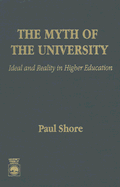Shore, P. J. (1992). The myth of the university: Ideal and reality in higher education. Lanham: University Press of America
 This is an interesting and readable book, and although it was not well reviewed (largely on account of being impractical, and perceived as elitist and reactionary) I felt the author made some important points. At the crux is the dialectic between the university as an intellectual “community of scholars” (with a nostalgic look back to medieval times) and the socio-political reality of universities as training for profitable employment and the entry of universities into a competitive marketplace.
This is an interesting and readable book, and although it was not well reviewed (largely on account of being impractical, and perceived as elitist and reactionary) I felt the author made some important points. At the crux is the dialectic between the university as an intellectual “community of scholars” (with a nostalgic look back to medieval times) and the socio-political reality of universities as training for profitable employment and the entry of universities into a competitive marketplace.
The book has its shortcomings for sure, but Shore does try to grapple with the key question of “what should a modern university be” and as such it has considerable value, particularly for Catholic Universities trying to establish their place in the current economically driven education system. Shore also incorporates a detailed history of American universities which I found interesting. Unfortunately the comprehensive references are mostly buried in chapter-by-chapter footnotes.
Shore’s assertion that “the view that an American university must always be accountable in a monetary or practical way for all of its activities, is erroneous and cannot be allowed to dictate the university’s mission” (p.12) is certainly controversial in the current climate of assessment and accountability. To have no accountability seems dangerous as well as impractical, but the point that short-term “outcomes” do not necessarily correlate with long-term individual and social benefits deserves consideration.
Although this work does not address Catholic universities or theology, Shaw frequently notes the need for critical intellectual and spiritual components, for example “the most important contribution of the university is individuals who can think individually and purposefully to the conclusions of questions … who recognize the importance of confronting issues of spirituality and human existence” (p.14). He also argues in favor of what might be seen as elitism but perhaps would be better termed “selectivity”: admission (for faculty as well as students) should be based on willingness and preparedness to commit to the intellectual life. He is opposed to the idea of a university as a “job training ground”, noting that vocational colleges and similar institutions rather than true universities should be filling that role.
In historical perspective, he notes that “American higher education continues to be bedeviled by the same competition and striving for status” that led to the demise of many early colleges (p. 39), and also deplores similar competition between departments and majors within institutions (p.72). Shore also draws attention to the lack of teaching preparation for PhD students (p.65) and the growing “tension between the competing roles of instructor and researcher” (p.93). He also points out that when students (and faculty) are forced to work elsewhere due to inadequate funding or pay it dilutes the mission and “the most important aspect of the university experience: participation in a community committed to teaching and learning (p.113), as do excessive paperwork and administrative duties for faculty. He is also concerned about the growing “consumerism” of education – the attitude that students have paid for a degree and the university is responsible for granting it, rather than taking joint responsibility for their own education and the “self-transformation which is essential for any real success in post-secondary education” (p.126).
Shore has plenty more to say, covering a broad range of issues such as over-specialization (a commonly noted problem), student athletes, tenure, promotion and peer-review procedures (in particular, lack of adequate recognition for teaching and an over-emphasis on peer-reviewed publication) and dwindling popularity and support for the humanities as an essential part of a liberal education. However, the major challenge to his proposal for more traditional, more selective, less consumerist and better funded universities is socioeconomic – for example “we will have to spend billions more on financial aid” or limit a university education to the few who can afford to pay (p.113). While it is probably true that far more is spent on cosmetics and that the spending would be repaid in public service and reduced crime, this would be a difficult investment to “sell” in the current political climate and economy. The following quotation captures this nicely:
“Students in American universities, faced with the need to make considerable financial sacrifices in order to complete their education and socialized from elementary school onward to see education as a means to find a higher paying or higher status job, are understandably concerned with the usefulness of what they must learn. Students are also influenced by the pervasive and unrelenting materialism of our society, a materialism in which the university often participates with its emphasis on expansion and fund raising” (p. 199-200)
In closing, Shore notes that “Professional training, socialization and perhaps even credentialing are important functions of the university, but without the ability to think and react humanely, the university graduate is poorly equipped to serve society or to experience the best that society can offer” (p. 234-5).
Questions
The challenge of economic materialism and the demand to provide “value for money” (which insistently repeats in later publications) is probably the most difficult one that we face. For students, debt and future employment are very real (and distracting) concerns. What is the best approach to addressing this?
Note: Collini (2012) makes an interesting case for not adopting the defensive position of pleading the “economic benefits of education” which is foreshadowed in this earlier work.